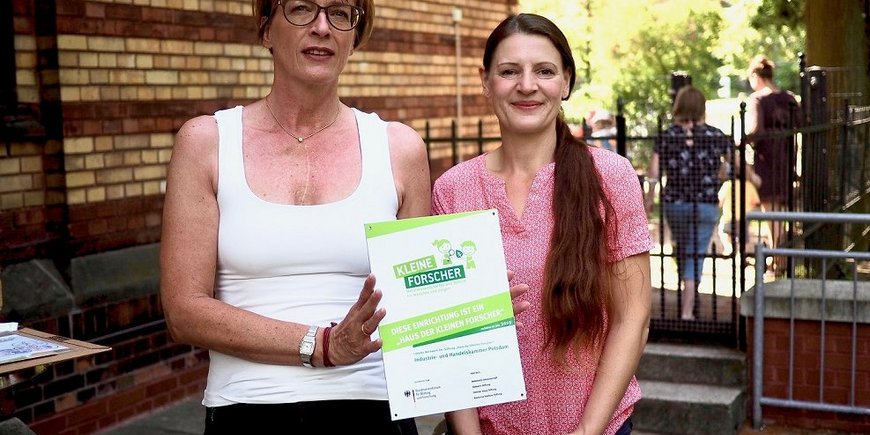The foundation ‘Haus der kleinen Forscher’ (HdkF) (German for ‘House of Little Researchers’) networks day-care centres, after-schools and schools throughout Germany, which particularly promote the research spirit of children. For an institution to be certified, mathematics, information technology, natural sciences or technology (MINT) or education for sustainable development (ESD) must be an integral part of children's everyday lives there. The projects, observations and experiments must be documented and educators of the institution regularly take part in appropriate training courses. Certification must be renewed every two years. The HdkF Foundation is funded by the German Federal Ministry of Education and Research. Partners are the Helmholtz Association, the Siemens Foundation, the Dietmar Hopp Foundation and the Deutsche Telekom Foundation.
Almost 5,000 of the 55,000 daycare centers in Germany are certified as ‘Haus der kleinen Forscher’. Now the day nursery at Albert Einstein Science Park is once again part of it. On June 19, Ulrike Krüger from the HdkF network of the Potsdam Chamber of Industry and Commerce (IHK) presented a new badge to the applause of the children visiting Geolino. Ulrike Krüger was already present at the first certification of the Geolino in 2010. The certification was confirmed in 2012, but not afterwards. "Since January 2018, we have been working on becoming a ‘Haus der kleinen Forscher’ again," says Susanne Mann, who is head of the nursery. "We want to show the children how they can find answers to their questions themselves. The children bring a lot with them right from the start".
The Geolino nursery was founded in 2004 by the GFZ and the Potsdam branch office of the the Potsdam Research Centre of the Alfred Wegener Institute, Helmholtz Centre for Polar and Marine Research (AWI) with ten places. It currently has 44 places. Two of them are kept free to give visiting scientists the opportunity to come to Potsdam with their families and do research on the Telegrafenberg, even at short notice. The children come from many different countries, cultures and language areas – just like their parents who work on Telegrafenberg. The user community of the research facilities there provides the premises free of charge and makes a financial contribution to ‘special tasks for the integration of non-German-speaking children’. Since 2009, Kita Geolino has also been part of Potsdam's demand plan and is therefore regularly financed by the city. (ph)
Further information:








![[Translate to English:] Torsten Sachs in front of a climate station on a field](/fileadmin/_processed_/3/9/csm__TorstenSachs_bearbeitet_GS_4a1365ef84.jpeg)

![[Translate to English:] left image flood at the Ahrtal: image from above, several houses are flooded; left image:: Heidi Kreibich;](/fileadmin/_processed_/4/4/csm_Bild2_9af0130e9f.png)



![[Translate to English:] Start der Vega Rakete](/fileadmin/_processed_/6/4/csm_20231201-kachel_Vega-VV23-launch_ESA-CNES-Arianespace_706716b68c.jpeg)









![[Translate to English:] Poster exhibition at the Brandenburg Hydrogen Day at the GFZ, some participants in the foreground](/fileadmin/_processed_/6/5/csm_Erster_Brandenburgischer_Wasserstofftag_GFZ_402fcec95e.jpeg)
![[Translate to English:] Group picture of the participants](/fileadmin/_processed_/9/4/csm_20231108_CAWa-Workshop-Tashkent_Gruppenbild_99ea779d8a.jpeg)

![[Translate to English:] [Translate to English:] Hörsaal](/fileadmin/_processed_/e/6/csm_H%C3%B6rsal_e21ac645fb.jpeg)


![[Translate to English:] The Delegations in the Historic Library on the Telegrafenberg. In the back there are from left to right, the Dutch Ambassador for Germany, Ronald van Roeden, the Dutch Minister for Education, Culture and Science, Robbert Dijkgraaf and the scientific director of the GFZ, Susanne Buiter.](/fileadmin/_processed_/d/b/csm_Kachel-2_9eba4b4212.jpeg)

